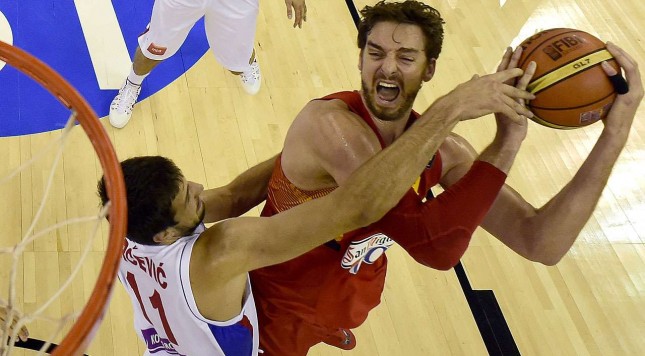NBA analysts are spoiled by the grueling 82 game schedule. Some may complain about a lack of data, but it’s a wealth of information compared to the FIBA tournament. Not only are there only five games in the qualifying stage before the “playoffs,” but teams are separated into groups that do not play each other. It’s impossible to directly compare a team’s strength in one group to the other; you need indirect means. Unfortunately, past tournaments do not provide an accurate guide: there’s only a small amount of continuity between tournaments, especially with the elite teams who have NBA-caliber players taking summers off. Thus, I’ve used exhibition games to bridge the gaps between groups, weighing the exhibition games less and only including those where both are FIBA World Cup teams.
There were 21 games listed by FIBA as “preparation games” where both teams were invited to the FIBA World Cup. I also found ten more games from various FIBA tournaments: Centrobasket, Antibes, and the Asia Cup. To clarify, I did not use games that involve nations like Russia, who did not make it; B teams where a team that’s already qualified sends an inferior squad with different players; or any games with sinister basketball teams like Beyond Biotechnology, which may or may not be comprised of genetically enhanced super athletes (since they were knocked out by Chinese Tapei, perhaps not.)
Without further ado, with a simple minimization of the sum of squared errors of every game’s point differential, weighing group games twice as much, here are the ratings:
| Team | Strength rating |
|---|---|
| United States | 30.1 |
| Spain | 20.2 |
| Brazil | 15.3 |
| Slovenia | 10.1 |
| Australia | 9.4 |
| Lithuania | 9.1 |
| Greece | 6.8 |
| France | 5.1 |
| Argentina | 4.8 |
| Serbia | 2.8 |
| Ukraine | 1.6 |
| Mexico | 0.9 |
| Turkey | 0.7 |
| Croatia | -2.2 |
| Angola | -3.5 |
| New Zealand | -4.8 |
| Dominican Republic | -7.0 |
| Iran | -7.6 |
| Finland | -9.1 |
| Philippines | -12.0 |
| Puerto Rico | -13.2 |
| Senegal | -13.4 |
| South Korea | -16.4 |
| Egypt | -27.8 |
The first observation is that this U.S. team is better than expected, which happened in 2010 with what was considered the “B team,” but this is even more extreme. If you’ve been observant, a 30.1 rating is the same the US had in 2012, but those ratings are not to be compared directly. Based on past trends, I have a rough translation of 6.7 points from FIBA with 24 teams to the Olympics — meaning, the 2014 team would have an estimated rating of 23.4 in the Olympics. They’re not perfect, but we knew even with suboptimal players they’d still pack a wallop.
Spain, meanwhile, has destroyed a tough group with ease and is only slowed down by a weaker exhibition. If you ignore their exhibition games, they’re a team punching near a 23 rating, which would make them a contender for best international non-U.S. team in decades and, arguably, forever. While the predictions that Spain is more likely to win in a match-up with the U.S. might be slight overreactions, Spain does possess the tools to counter them. They have enough size to thwart the U.S.’s offensive rebounding, an interior defense elite enough to hold their own, passing to get around the athletic but quickly assembled defense, and guards who can handle ball pressure. Calderon’s one of the least turnover-prone point guards in NBA history, Rubio has proven himself a capable high-level passing guard, and Navarro has had his own stint in the NBA.
FIBA’s last silver medalist, Turkey, has a near 0 rating, but they’ve lost some key guys and struggled against teams without elite talent like Finland and don’t have homecourt advantage (the tournament was in Turkey in 2010.) Brazil is once again one of the strongest teams and may end up with a bronze. The list of dark horses is fairly large: Greece has been impressive as they begin to transition to a new generation, Slovenia looks strong, and Australia could be a pest.
Group point differential is nothing to dismiss either, as the four finalists in the 2010 tournament had four of the top five group point differentials. Spain, oddly enough, was the fifth team, and they were upset early. The pattern held in 2006 where the top three teams by a mile in group play point differential were all in the FIBA final four; Greece was the fourth team, and they were only a couple points behind the teams with the fourth and fifth highest point differentials, respectively.
History suggests Spain and the U.S. are near locks, with Brazil tagging along. The fourth team will come from a specific part of the bracket where Lithuania and Australia are the best bets as gate-keepers to the gold medal game for the United States. Slovenia may give the Americans a harder fight, as they had a slightly higher point differential and are likely to face them in the second round.
But we’re still dealing with a limited amount of information. Take any slice of 5 to 10 games in the NBA regular season, and you’ll find misleading results. I won’t say my ratings have a high degree of certainty, and that’s because I’m not crazy. But they’re the best I’ve got.




















